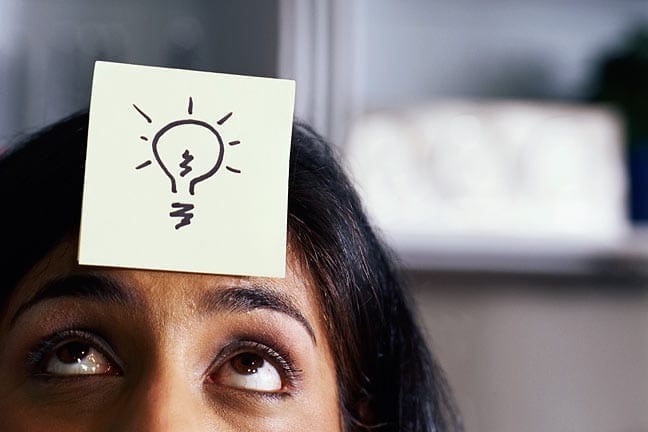You use your mind every day, but do you really know how it works?
YouBeauty Psychology Advisor, Art Markman, Ph.D., professor of psychology at University of Texas, Austin, has been studying how our minds work for more than twenty years. As a professor, researcher and editor of the journal Cognitive Science, he knows quite a bit about how your mind works—and how you can use that information to your advantage.
We sat down with him to discuss his new book, “Smart Thinking: Three Essential Keys to Solve Problems, Innovate, and Get Things Done,” a clear, engaging look at how your mind works plus tips to help you become a smarter, more creative thinker. Enter for a chance to win the book (we’re giving away five copies!) by leaving a comment below, telling us what bad habit do you hope to break this year. Full rules here.
YB: What do you think keeps most people from being smart thinkers already?
Dr. Markman: Well, I think there are two pieces to that, one of which is a lack of understanding about how your mind works. We ask people to think for a living and we don’t provide any information about how your mind works. We would never let somebody build a bridge without learning physics or practice medicine without learning biology. It’s hard to fine-tune your own thinking processes if you don’t actually know how your mind works.
Second, there’s this belief that the Einsteins and the John Lennons and the Steve Jobs of the world are doing something fundamentally different from what the rest of us are doing. And the fact is they’re not. All of us have the capacity to think more effectively. So much of what makes us smart has to do with what we know and our ability to use that knowledge. Learning things is something that all of us can do and that has a much more profound influence on your ability to be smart than anything an intelligence test can measure.
COLUMN: New Year’s Resolutions, At Any Time of Year
YB: In the book, you talk a lot about acquiring high-quality knowledge as a cornerstone for smart thinking. With so much information coming at us all the time, how can we remember information that could be useful to us later on? It just seems like there’s so much.
Dr. Markman: Well, I think you have to recognize that you’re never going to know everything about everything. What you have to do is simply put yourself in a position where every time you encounter something you could learn, you learn it. From grade school on, we learn to cram at the last minute, but that’s not the way learning really works. Learning is this day to day process of really putting in effort to understand something that’s in front of you, to explain it to yourself, to work hard to make connections between the thing that you’re encountering right now and things that you’ve experienced before.
YB: You give some great tips for how to learn well and I hear some of them in what you just said. Can you explain those tips a bit more?
Dr. Markman: The first thing you have to do when you want to learn well is to actually pay attention and engage in the learning process. The biggest danger of the modern world isn’t that there’s so much information; it’s that there’s so many distractions. The single biggest killer of learning is multi-tasking. We have to stop multi-tasking. If you need to learn something, shut off your instant messaging, don’t answer your phone, don’t let people come and interrupt you. Create a space for you to learn things.
Second, memory is all about connection. Make sure that you work to connect what you’re learning to things that you already know. We don’t learn lists of things. We don’t learn independent facts. We learn about how things are connected to each other because memory wants to give us whole chunks of information that are going to be useful in a particular setting. When you’re learning, ask ‘what are other things I know about that are like this and how can I find connections between all of those?’
The third piece to remember is to focus yourself on what it is that you’re supposed to remember. We’re all constantly running onto the next thing. Instead, if you spend a minute or two minutes reviewing the experience that you just had and thinking, ‘what are the three most important elements of what I just experienced,’ your memory for those elements will be so much better later.
YB: If someone does commit this knowledge to memory, then when they’re faced with a problem they’re trying to solve, how can they weed out the specific knowledge they need at that moment?
Dr. Markman: In situations where you get stuck, the likely possibility is that you do know something that’s going to help you solve the problem, only you don’t realize it yet because you didn’t learn about it in that specific circumstance. That’s where you have to start playing the game of re-describing the problem to figure out its essence.
Take your problem and try to give it a good title, a title that really grabs the essence of it. What sort of a problem is this? Once you find that essence, now suddenly you’ll realize that there are all sorts of other things that you know about that might be relevant. For example, think about a company that makes at-home hair color. The problem with coloring your hair at home is that you want to color your hair without coloring your skin, the bathroom counter, the walls, right? How do you do that? How can you create a dye that works on hair and not on anything else? The essence of that problem is a problem that you could call the “collateral damage problem.” Which is basically, you have this thing you’re trying to affect, which is surrounded by all these other things you don’t want to affect and you want to make sure you only affect the stuff you want to affect. And the fact is, lots of people deal with this collateral damage problem—people who make weed killers want to kill the weeds on your lawn without killing the grass, oncologists want to eliminate cancer cells without destroying healthy tissue. It might turn out that the kinds of strategies they use might actually be useful in helping you to think about the problem you’re grappling with. Simply by re-describing the problem, you realize you did know something that was relevant, you just hadn’t described it in that way before.
YB: You talk a lot about smart habits as well. Why are smart habits an important part of smart thinking?
Dr. Markman: We are habit-creating machines. We want to automate as much of our lives as possible. What I encourage people to do is to take smart thinking strategies and turn those into habits so that you end up mindlessly doing things that will make you smarter, mindlessly engaging in practices that will help you to learn more effectively. For example, if you make re-describing problems a habit, then you won’t even notice you’ve gotten stuck anymore because you’re immediately thinking of the six different ways that you can re-describe your problem. To me, that’s why habits are so crucial.
COLUMN: Changing Habits, Beautifully
YB: Are there any differences between a mental habit and a physical habit, like say, smoking?
Dr. Markman: I would say no. Habits are just another operation of your memory. Most of the time, we think of memory for information, like experiences or names. But there’s also memory for actions. Some of those actions are physical actions—lifting a cigarette to your mouth or hitting a baseball—but some of those actions are mental actions. The principles underlying habits are the same whether what you’re doing is eating too much or thinking in a way that’s not that effective.
YB: It’s so easy to identify some of those physical habits, like eating too much or smoking. We are aware that it’s bad and we are aware that we’re doing it. How can someone identify negative mental habits that they might not be aware of?
Dr. Markman: I guess what I would say is that we begin to recognize any habit as being a potentially bad habit the more that we learn about the area. For example, for a long time nobody was really sure that smoking was seriously bad for your health, so it wasn’t necessarily a bad habit. It became a bad habit as the connection between cigarette smoking and disease became clearer. I think the same thing is true with thinking. That is, the more you learn about the way that your mind works, the more that you can begin to recognize which of the habits that you engage in are the ones that are getting in the way.
YB: I loved your anecdote toward the beginning about helping your son with his homework. How can parents help their kids become smart thinkers?
Dr. Markman: Well, one thing that parents can do is to encourage their kids to really get interested in the details of things rather than trying to learn just to get good grades. At some point, we all seem to get extremely focused on the grades. You can’t ignore grades, but in the long run, you need to learn how to learn, you need to learn how to ask questions. A kid’s favorite question is often, ‘why?’ And as parents, we don’t necessarily like the question why because a lot of the time, we’re not so sure of the answer ourselves. But you could treat that as a learning opportunity for everybody.
YB: And at the same time, you show them how you learn and how you would find that information. There’s actually a commercial, I think it’s for a smartphone, where a dad is camping in the woods with his kid. The kid is asking him all these really hard questions and the dad is looking the answers up on his phone. But the kid doesn’t know that so he gets the impression that his father is all-knowing. I always looked at that and thought that’s a missed opportunity to teach him how to look something up or find reliable sources.
Dr. Markman: Yeah, I think that’s absolutely right. As parents, we’re trying to teach our kids that ‘smart’ is a process, not a thing. This is really important because if you believe that being smart is a thing, then the moment that you hit something you don’t understand, you begin to think, ‘Well that’s my limit. I’ve found the thing I don’t get.’ Whereas, if you think of smart as a process, then whenever you hit something you don’t know, you treat it as an opportunity. Here’s a chance for me to get even smarter.
MORE: Can You Lose Weight By Thinking Differently?
Whether or not you have kids to humble you with never-ending ‘why’ questions, hopefully all of us can strive to see every problem or knowledge gap as a chance to get even smarter.
To read more about using your mind more effectively, check out Dr. Markman’s book, Smart Thinking: Three Essential Keys to Solve Problems, Innovate, and Get Things Done.








































